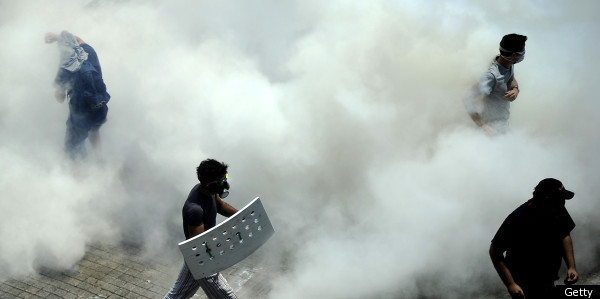 ATHENS (Reuters) – Greek police fired teargas and battled groups of hooded youths near parliament on Tuesday in a rally against anti-austerity measures international lenders have demanded to stave off national bankruptcy.
ATHENS (Reuters) – Greek police fired teargas and battled groups of hooded youths near parliament on Tuesday in a rally against anti-austerity measures international lenders have demanded to stave off national bankruptcy.Parliament is due to vote this week on a package of spending cuts, tax increases and privatizations agreed as part of a massive bailout aimed at averting the euro zone's first debt default.
Labor unions launched a 48-hour strike to protest the measures and more than 5,000 police were deployed to the center of the capital to deal with the protests, with most attention focused on Syntagma Square in front of the parliament.
The rally was initially peaceful but by early afternoon, hundreds of youths, many wearing gasmasks and scarves covering their faces, hurled masonry chipped off buildings in the square at riot police who responded with tear gas.
Officials said four police officers were injured by flying stones and one person was stabbed during fights between rival groups of young demonstrators and three others were injured while a number of people were treated with breathing troubles.
Eighteen people were detained and three formal arrest charges were laid, police said.
Violence continued throughout the afternoon and protesters set fire to two communications trucks with mobile telecoms transmitters which they had apparently mistaken for TV trucks and sprayed with slogans attacking the media and banks.
As a crowd initially estimated at more than 20,000 thinned out, clouds of white smoke swirled above the square and police with shields and riot helmets stood by, occasionally launching charges to disperse a harder core of mainly young demonstrators.
Transport, schools and other services as well as many private businesses were shut as a result of the strike called by ADEDY, the union representing half a million civil servants and GSEE, which represents 2 million private sector workers.
Earlier, protesters had marched through the capital chanting slogans, banging drums and carrying banners attacking the terms of the bailout which many Greeks feel imposes harsh penalties on ordinary pensioners and workers while sparing the rich.
"The measures are for the good of the banks not for the good of workers," said Yannis Tsounis, 38, a municipal worker. "Europe must not see us as pariahs. We are beginning to feel as not being a part of Europe."
Full Article
Source: Huffington
No comments:
Post a Comment